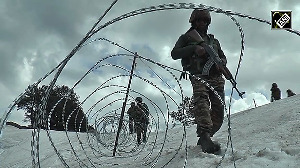Sri Lanka on Thursday blamed strategic alliances and domestic political issues, an apparent reference to politics in Tamil Nadu, for the UNHRC resolution that was backed by India to censure Colombo for its alleged war crimes during the ethnic conflict with the Liberation tigers of Tamil Eelam.
Responding to the adoption of the US-sponsored resolution by the UN Human Rights Council (UNHRC) in Geneva, Foreign Minister GL Peiris said Sri Lanka had performed remarkably.
"It is a matter of great satisfaction to us that 15 countries voted with Sri Lanka, despite the intensity of pressure, in a variety of forms, exerted on them all," said Peiris, who was present when the vote was taken in Geneva.
"With 15 countries voting with Sri Lanka, and 8 countries abstaining, the final result was that 23 countries, out of a total of 47 members of the Human Rights Council, did not support the Resolution, while 24 supported it. The margin was as narrow as this," he said in a statement.
Peiris said the most distressing feature of this experience is the reality that voting at the Council is now determined not by the merits of a particular issue but by strategic alliances and domestic political issues in other countries which have nothing to do with the subject matter of a Resolution or the best interests of the country to which the Resolution relates.
Analysts said Peiris' mention of domestic political issues was an inference on India who voted in favour of the US resolution due to pressures from DMK.
"This is a cynical negation of the purposes for which the Human Rights Council was established. Many countries which voted with Sri Lanka were acutely conscious of the danger of setting a precedent which enables ad hoc intervention by powerful countries in the internal affairs of other nations".
India had initially shown reluctance to vote on a nation-specific resolution but had to change its stand under severe pressure from political parties in Tamil Nadu, particularly DMK which had threatened to pull out its ministers from the UPA government at the Centre if India either abstained or supported Sri Lanka during the vote on the resolution.
The 47-member UN Human Rights Council adopted the resolution which noted with concern that an internal inquiry report in Sri Lanka does not adequately address "serious allegations" of violations of international law.
It also asked Colombo to present as expeditiously as possible a comprehensive action plan detailing the steps to implement the recommendations of the Lessons Learnt and Reconciliation Commission (LLRC) to address alleged violations of international law.
It also binds the government to seek technical assistance from the UN High Commisssioner for addressing Human Rights concerns.
Sources said India decided to vote after persuading the resolution-sponsor to make two changes in the draft so that it became "non-intrusive" and contribute to political reconciliation process in the island.
India did not participate in the debate but voted with countries like Austria, Belgium, Czech Republic, Italy, Spain, Switzerland, Uruguay and the US.
Many of India's neighbours, including China, Bangladesh and Maldives, and Russia, Kuwait, Saudi Arabia and Indonesia were among the countries that voted against the resolution which asked the Sri Lankan government to implement the constructive recommendations of the LLRC.
The resolution was the culmination of international pressure on Sri Lanka over its rights record which resulted in the appointment of a special panel by the UN Secretary General.









 © 2025
© 2025